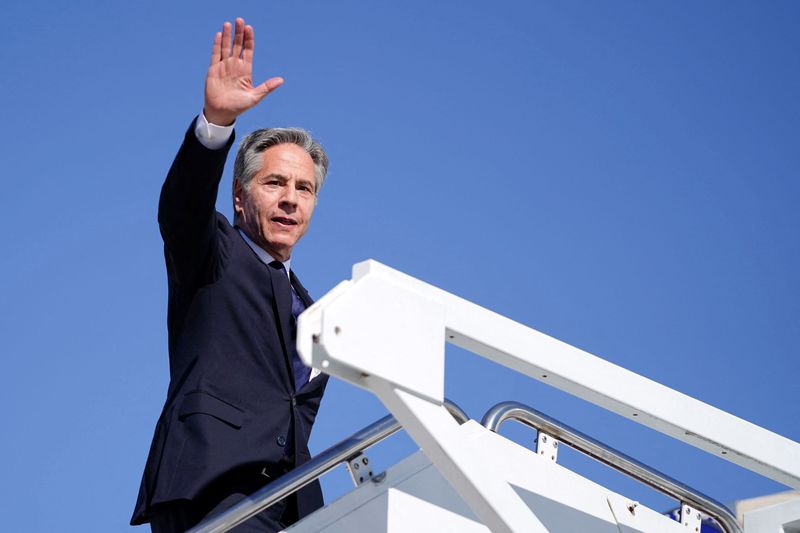By Humeyra Pamuk
TEL AVIV (Reuters) - U.S. Secretary of State Antony Blinken arrives in Israel on Tuesday, the first stop of a wider Middle East tour aimed at reviving Gaza ceasefire talks and discussing the enclave's future following the death of Hamas leader Yahya Sinwar, but any breakthrough ahead of the looming U.S. election looks elusive.
The top U.S. diplomat's latest trip - his eleventh to the region since Palestinian Hamas militants attacked southern Israel on Oct. 7 triggering the Gaza war - comes as the Israeli military has intensified its campaign in the Palestinian enclave as well as in Lebanon against Iran-aligned Hezbollah militia.
Blinken's planned week-long trip, which will include a stop in Jordan on Wednesday and Doha, also comes as the region braces for Israel's response to Iran's Oct. 1 ballistic missile attack on Israel. The retaliation could disrupt oil markets and risks igniting a full-blown war between the arch-enemies.
On Gaza, Blinken will focus discussions on how to end the war, plans for the enclave after the fighting ends and how to improve humanitarian assistance, said a senior State Department official, speaking on condition of anonymity.
Last week Blinken and U.S. Defense Secretary Lloyd Austin wrote to Israeli officials demanding concrete measures to address the worsening situation in Gaza, or face potential restrictions on U.S. military aid.
The official said that in his meetings with Israel and Arab countries Blinken will drill down on "day after" issues, particularly security, governance and reconstruction. Having detailed plans for each of these has been seen as prerequisites for achieving any lasting resolution to the conflict.
The secretary of state will also discuss with Israel and other countries how to secure a diplomatic resolution to the conflict with Hezbollah, and will continue Washington's conversation with the Israelis about their expected response to Iran's missile attack, said the official.
BREAKTHROUGH "HARD TO IMAGINE"
Experts say Hamas and Israel remain deeply at odds and are unlikely to make significant concessions before the Nov. 5 U.S. presidential election, which could upend U.S. policy.
"It's very hard to imagine" that Blinken would score a breakthrough this week, said Aaron David Miller, a senior fellow at the Carnegie Endowment for International Peace, given that neither Hamas nor Netanyahu have any urgency to end the war.
"Taking advantage of the moment is a fundamentally misleading sort of concept in this case because I'm not sure there is a moment," Miller said.
The Biden administration has cast the killing of Sinwar by the Israeli military last week as a possible opening that would finally pave the way to end the Gaza war, but Israeli Prime Minister Benjamin Netanyahu says fighting will continue.
Israel is accelerating military operations to push Hezbollah away from its northern border while thrusting into Gaza’s densely packed Jabalia refugee camp in what Palestinians and U.N. agencies fear could be an attempt to seal off northern Gaza from the rest of the enclave.
Analysts say Netanyahu may prefer to wait out the end of U.S. President Joe Biden's term, which ends in January, and take his chances with the next president, whether Democratic nominee Kamala Harris or her Republican rival Donald Trump. Netanyahu spoke to Trump about the conflict by phone on Saturday, both Trump and Netanyahu's office said.
A Gaza ceasefire proposal that the U.S. and mediators Egypt and Qatar have worked on for months is no longer feasible, Miller said, and the lack of command and control within Hamas also complicates the negotiation process.
"The proposal that would be most realistic would be if Blinken came and said 'we'll do an all for all'. You get all the hostages back, and the Israelis will declare a ceasefire," Miller said, cautioning that even that formulation would have many questions that needed to be answered.

Speaking to reporters on Monday, deputy State Department spokesperson Vedant Patel insisted that U.S. officials feel "there is an opportunity to move the ball forward" on a ceasefire.
"I'm not going to speculate on any immediate end product or outcome (from the trip), but we feel that it is important to engage not just with the Israelis, but also other partners in the region," he said.